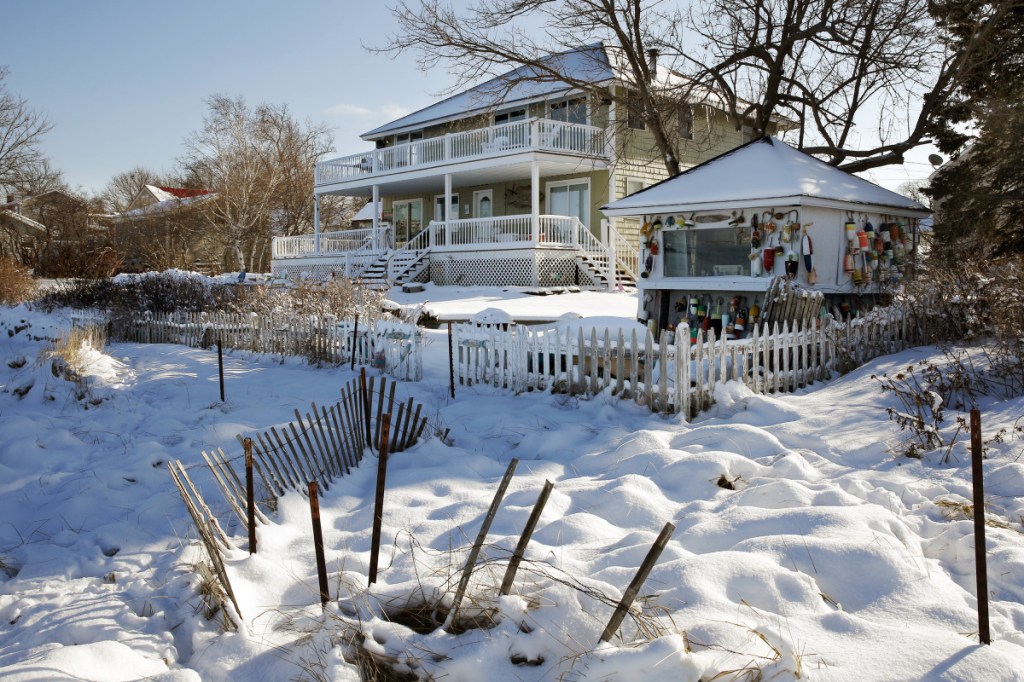SOUTH PORTLAND — Residents continued to battle over new short-term rental regulations Tuesday night, even as the City Council merely set a date to reconsider the controversial rules as required by a recent referendum petition.
On April 3, the council will hold a seventh public hearing on Airbnb-style home rentals and vote on whether to repeal regulations that were approved last month. The council made only brief comments after setting the date.
“I certainly am ready to listen,” said Councilor Maxine Beecher.
Preble Street resident Michael Frabotta and fellow petitioners collected an estimated 1,484 petition signatures in an effort to force the council to reverse its 6-1 vote on Feb. 20. If the council fails to overturn the rules, the city will hold a referendum on the petition question at an upcoming election.
The city clerk’s office certified 1,289 signatures of registered voters – well over the 1,000 needed to suspend the new rules from going into effect and move the petition forward for council reconsideration.
At the center of the disputed regulations is a ban on unhosted stays in residential neighborhoods that aims to stop people from buying and converting single-family homes into whole-house rentals.
There are 282 short-term rentals in South Portland offered on websites such as Airbnb and HomeAway, according to a recent count by Host Compliance, a third-party web service. About 200 of them are single-family homes that are not owner-occupied, allowing travelers to rent a whole house or apartment for a few days or a few weeks.
PART OF A NATIONAL TREND
South Portland is one of the latest U.S. cities to grapple with the spread of short-term rentals, along with neighboring Portland. South Portland’s outright ban of non-owner-occupied rentals is the most restrictive so far in Greater Portland.
Cape Elizabeth adopted a permitting process in 2012 that allows the town to revoke the permit if the property is the subject of three complaints within three years. Portland passed a more involved registration process last April that sets a cap on the number of non-owner-occupied rentals citywide at 300.
Other U.S. cities, including New York and Nashville, also have banned or severely restricted unhosted home rentals, although the crackdowns have proved difficult to enforce. A recently released study by McGill University researchers concluded that most short-term rentals in New York are illegal and that the practice has fueled a housing shortage and rent increases.
Public comment Tuesday night on the South Portland regulations was limited to open citizen discussion periods near the beginning and end of the council meeting.
Frabotta and other petitioners say they’re trying to protect landowners’ rights and fighting for a better municipal review process. The council held four workshops and a total of six public hearings before passing the regulations.
Frabotta chided councilors for showing a “lack of leadership” and promoting division in the community. He urged them to repeal the new rules and set up a committee of stakeholders to develop “reasonable regulations.”
“Use your positions for leadership and work to alleviate the environment of us vs. them,” Frabotta said. “I want to ensure that you, the public, have a chance to vote on sweeping ordinances restricting your land rights.”
COMMUNITY IN CONFLICT
Supporters of the new regulations say they are trying to preserve affordable housing and protect neighborhoods from being overtaken by commercial home rentals they describe as mini-hotels.
“Operating a boutique hotel next door to my residential home is a violation of my property rights,” said Peter Stanton of Deake Street.
Stanton disputed the claim of some petitioners, overheard while they were collecting signatures, that a clause in the new regulations would eliminate a wide variety of home occupations.
“People heard this message and were duly alarmed,” Stanton said. “You can find essentially identical (ordinances) in Cape Elizabeth, Portland, Westbrook, Falmouth, Scarborough, Saco, Windham, Cumberland and Yarmouth. … All manner of home occupations are thriving in all of those towns.”
Stanton and several other speakers urged the council to let the regulations go to referendum.
“Defend your ordinance. Defend your honor. Defend our neighborhoods,” Stanton said.
Tensions between the two sides escalated the weekend of March 10, when Frabotta and other petitioners were confronted by residents who said they were “shadowing” petitioners because they were overheard giving false or misleading information about the regulations.
That Saturday, petitioners called police several times, prompting Officer Andrew Nelson to issue a cease harassment notice to Daniel Romano based on a complaint filed by Frabotta. The following Monday, Frabotta took out a restraining order against Romano because, he said, he continued to feel threatened by Romano.
Romano said Tuesday that he plans to contest the order when he appears in District Court on March 30.
Kelley Bouchard can be contacted at 791-6328 or at:
kbouchard@pressherald.com
Twitter: KelleyBouchard
Send questions/comments to the editors.


